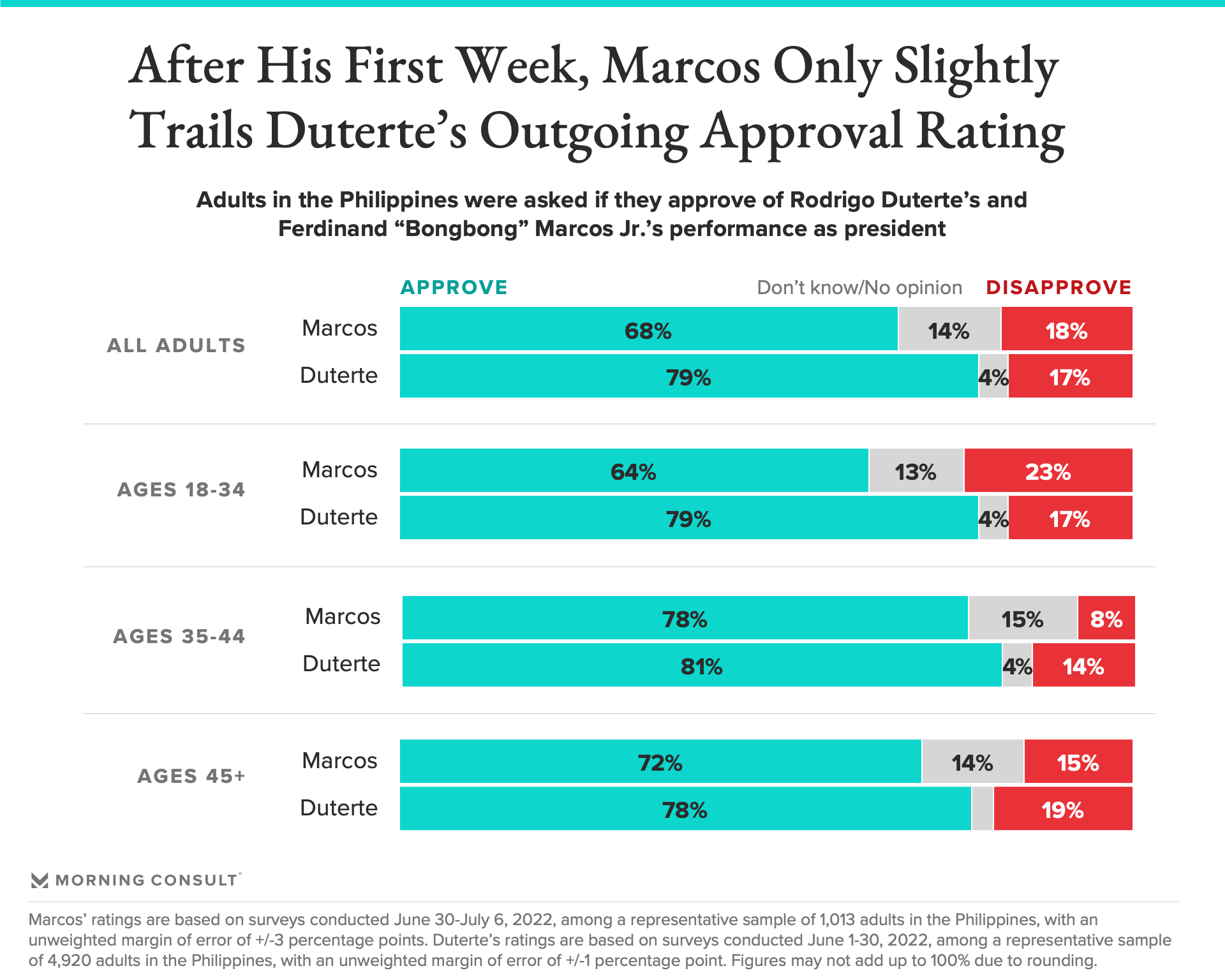Bongbong Marcos Is Popular in the Philippines, but He’s Not Yet in Duterte’s League
Ferdinand “Bongbong” Marcos Jr. was last week sworn in to office, becoming the first president since his authoritarian father, who ruled for two decades before he was overthrown, to be elected with a majority of the popular vote. Morning Consult surveys show Filipinos largely approve of the performance of the younger Marcos after his first week in the Malacañang Palace.

What Filipinos think about Bongbong Marcos
- Nearly 7 in 10 Filipino adults approve of Marcos’ job performance after his first week in office, with the strongest support — nearly 8 in 10 — coming from 35- to 44-year-olds, most of whom would have been young children when the new president’s father fled to Hawaii amid the 1986 People Power Revolution.
- The strong backing for Marcos is slightly less than the share of approval former President Rodrigo Duterte had among Filipinos during his last month in office, with about 8 in 10 adults across each age group backing the controversial figure, who is currently under investigation by the International Criminal Court for crimes against humanity.
- Marcos gets the least backing among Filipinos ages 18 to 34, all of whom were born after his father was driven from power. But even among that age group, almost two-thirds approve of his performance, compared with nearly a quarter who disapprove.
The return of the Marcos family
Running alongside Duterte’s daughter, Sara, as his vice presidential candidate, Marcos Jr. won the May 9 presidential election with 58.74% of the popular vote, more than double the share won by second-place candidate Leni Robredo (27.99%) and even leaving former boxing sensation Manny “Pacman” Pacquiao (6.85%) in his wake.
The path to power was cleared months ago after Sara Duterte decided against challenging the Marcos family scion to replace her father after his six-year term ended, and instead chose to form an alliance to campaign for the separate vice presidential election, which she eventually won with an even stronger 61.29% of the vote.
Still, Marcos’ victory was a testament to the success of a calculated social media campaign to whitewash memories of his father’s corrupt and brutal rule, which ended with his escape from the country and the restoration of democracy in the Philippines in 1986. Under Marcos Sr., martial law was imposed from 1972 to 1981, leading to tens of thousands of people being tortured, arrested, disappeared or killed, according to Amnesty International.
After he was driven from office, estimates put Marcos’ pillaging of the state at nearly $10 billion, prompting the creation of a special government body that continues to investigate, reclaim and auction the riches held by the former president and his wife, Imelda, which included jewels, precious stones, gold coins, designer clothing and shoes, and a “lost” Picasso painting.
Some now worry that Bongbong will use his power — and popularity — to end the hunt for his family’s ill-gotten wealth and give his 93-year-old mother a rest. Perhaps only a Duterte could stop that — and given their newfound family alliance, even that now seems unlikely: “About the stolen money, until now, they have found nothing,” the outgoing president said in May.
Marcos’ ratings are based on surveys conducted June 30-July 6, 2022, among a representative sample of 1,013 adults in the Philippines, with an unweighted margin of error of plus or minus 3 percentage points. Duterte’s ratings are based on surveys conducted June 1-30, 2022, among a representative sample of 4,920 adults in the Philippines, with an unweighted margin of error of plus or minus 1 percentage point. Figures may not add up to 100% due to rounding.
Alex Willemyns previously worked at Morning Consult as an editor for coverage of geopolitics and foreign affairs.